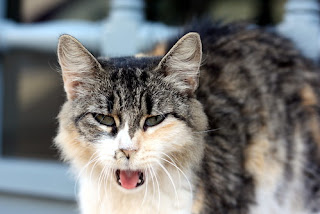Why Is My Cat Panting? A Detailed Guide- Ameowzingcats
Cats are known for their grace and agility, but what happens when you notice your feline friend panting? Panting in cats can be a cause for concern, as it is not a common behavior for them. In this article, we will explore the possible reasons why your cat may be panting and what you should do about it.
Understanding Cat Panting
Cat panting refers to the rapid and open-mouthed breathing pattern that is typically seen in dogs. Unlike dogs, cats do not pant as a regular cooling mechanism. Instead, they regulate their body temperature through other means, such as grooming and seeking cool spots.
Normal vs. Abnormal Panting
While panting is not normal behavior for cats, there are instances where it can be considered normal. For example, after intense physical activity or in a stressful situation, cats may pant briefly. However, if you notice your cat panting excessively or in non-stressful situations, it could indicate an underlying health issue.
Overheating and Dehydration
One of the common causes of cat panting is overheating and dehydration. Cats can easily become overheated, especially in hot weather or when exposed to direct sunlight for extended periods. Dehydration can also lead to panting as the body tries to cool down.
Respiratory Issues
Respiratory issues, such as asthma or bronchitis, can cause panting in cats. These conditions can lead to inflammation and constriction of the airways, making it difficult for the cat to breathe normally.
Heart Problems
Heart problems, such as heart disease or congestive heart failure, can result in panting. When the heart is not functioning properly, it can lead to fluid accumulation in the lungs, causing breathing difficulties and panting.
Stress and Anxiety
Stress and anxiety can manifest in various ways in cats, including panting. Cats may pant when they are anxious or experiencing a stressful situation, such as during travel or when introduced to a new environment.
Obesity and Lack of Exercise
Allergies and Asthma
Similar to humans, cats can also suffer from allergies and asthma. Allergic reactions or asthma attacks can trigger panting episodes in cats.
Poisoning and Toxin Exposure
If a cat ingests a toxic substance or is exposed to harmful chemicals, it can lead to panting as a symptom of poisoning. Immediate veterinary attention is crucial in such cases.
Upper Respiratory Infections
Upper respiratory infections, such as feline viral rhinotracheitis or calicivirus, can cause panting in cats. These infections affect the respiratory system and may result in difficulty breathing and panting.
Dental Problems
Dental issues, such as gum disease or tooth abscesses, can cause pain and discomfort, leading to panting in cats. Regular dental care is essential to prevent such problems.
Aging and Senior Cats
As cats age, they may experience various health issues, including panting. Age-related conditions like heart disease or respiratory problems can contribute to panting in senior cats.
First Aid for Panting Cats
If you notice your cat panting excessively, there are a few first aid measures you can take. Move your cat to a cooler area, provide fresh water, and gently wet their paws with cool water to help them cool down. However, it's essential to identify the underlying cause and seek veterinary advice.
When to Seek Veterinary Help
If your cat's panting persists, worsens, or is accompanied by other concerning symptoms such as lethargy, coughing, or blue gums, it's crucial to consult a veterinarian. They can perform a thorough examination, diagnose the underlying issue, and provide appropriate treatment.
Why Is My Cat Panting? FAQs
1. Is it normal for cats to pant after exercise?
Yes, cats may pant briefly after intense physical activity as a way to cool down. However, prolonged or excessive panting should be evaluated by a veterinarian.
2. Can stress cause panting in cats?
Yes, stress and anxiety can cause panting in cats. Panting may occur in response to new situations, travel, or other stressful events.
3. How can I prevent overheating in my cat?
To prevent overheating, ensure that your cat has access to a cool and well-ventilated environment. Provide fresh water at all times, and avoid exposing your cat to excessive heat or direct sunlight.
4. Can dental problems cause panting in cats?
Yes, dental problems, such as gum disease or tooth abscesses, can cause pain and discomfort, leading to panting in cats. Regular dental care and check-ups are important for maintaining oral health.
5. When should I seek immediate veterinary help for my panting cat?
If your cat's panting is severe, accompanied by other concerning symptoms, or if you're unsure about the cause, it's best to seek immediate veterinary attention. A veterinarian can evaluate your cat's condition and provide appropriate treatment.
In conclusion, understanding why your cat is panting is essential for their well-being. By being aware of the possible causes and seeking veterinary advice when needed, you can ensure that your feline friend receives the necessary care and attention they deserve.
Final Words
Cat panting is not a behavior to be taken lightly. It can indicate various health problems, ranging from minor issues to severe conditions. Understanding the possible causes of cat panting and seeking timely veterinary care is crucial for the well-being of your feline companion.







